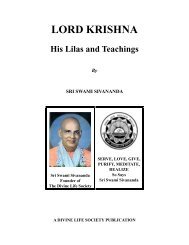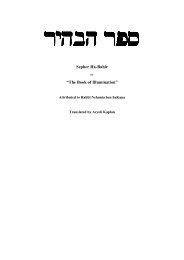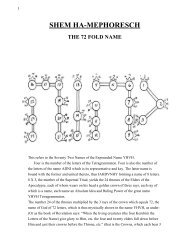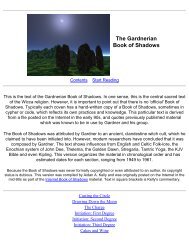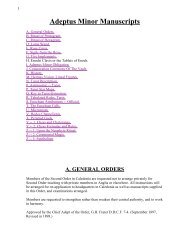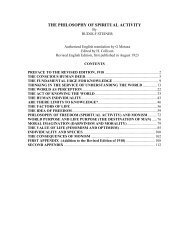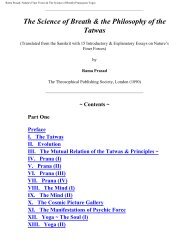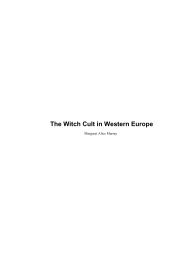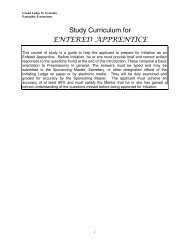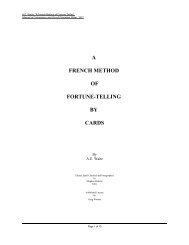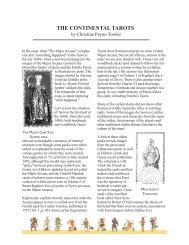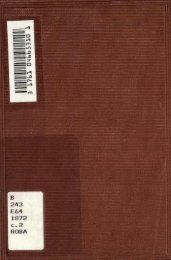Band 2 Anthropogenesis - H.P. Blavatsky
Band 2 Anthropogenesis - H.P. Blavatsky
Band 2 Anthropogenesis - H.P. Blavatsky
You also want an ePaper? Increase the reach of your titles
YUMPU automatically turns print PDFs into web optimized ePapers that Google loves.
So much so, that all ancient writings -- prose and poetry -- are full of the reminiscences of the Lemuro-Atlanteans, the first<br />
physical races, though the Third and the Fourth in number. Hesiod records the tradition about the men of the age of<br />
Bronze, whom Jupiter had made out of ash-wood and who had hearts harder than diamond. Clad in bronze from head to<br />
foot they passed their lives in fighting. Monstrous in size, endowed with a terrible strength, invincible arms and hands<br />
descended from their shoulders, says the poet (Hesiod, in oper. and dieb. v. 143). Such were the giants of the first<br />
physical races. The Iranians have a reference to the later Atlanteans in Yasna ix. 15. Tradition maintains that the "Sons of<br />
God," or the great Initiates of the Sacred Island, took advantage of the Deluge, to rid the earth of all the Sorcerers among<br />
the Atlanteans. The said verse addresses Zoroaster as one of the "Sons of God." -- It says: "Thou, O Zarathustra, didst<br />
make all demons (i.e., Sorcerers), who before roamed the world in human forms, conceal themselves in the earth" (i.e.,<br />
helped them to get submerged).<br />
The Lemurians, as also the early Atlanteans, were divided into two distinct classes -- the "Sons of Night" or Darkness,<br />
and the "Sons of the Sun," or Light. The old books tell us of terrible battles between the two, when the former, leaving<br />
their land of Darkness, from whence the Sun departed for long months, descended from their inhospitable regions and<br />
"tried to wrench the lord of light" from their better favoured brothers of the equatorial regions. We may be told that the<br />
ancients knew nothing of the long night of six months' duration in the Polar regions. Even Herodotus, more learned<br />
[[Footnote(s)]] -------------------------------------------------<br />
[[Footnote continued from previous page]] chapter just cited of the Apocalypse. Latona became a powerful goddess<br />
indeed, and saw her son receive worship (solar worship) in almost every fane of antiquity. In his occult aspect Apollo is<br />
patron of Number 7. He is born on the seventh of the month, and the swans of Myorica swim seven times around Delos<br />
singing that event; he is given seven chords to his Lyre -- the seven rays of the sun and the seven forces of nature. But<br />
this only in the astronomical meaning, whereas the above is purely geological.<br />
------------------------------------------------------------------------<br />
[[Vol. 2, Page]] 773 THE CYCLES OF TIME.<br />
than the rest, only mentions a people who slept for six months in the year, and remained awake the other half. Yet the<br />
Greeks knew well that there was a country in the north where the year was divided into a day and night of six months'<br />
duration each, for Pliny says so in his Fourth Book, c. 12. They speak of the Cimmerians and of the Hyperboreans, and<br />
draw a distinction between the two. The former inhabited the Palus Maeotis (between 45 [[degrees]] and 50 [[degrees]]<br />
latitude). Plutarch explains that they were but a small portion of a great nation driven away by the Scythians, which nation<br />
stopped near Tanais, having crossed Asia. "These warlike multitudes lived formerly on the ocean shores, in dense<br />
forests, and under a tenebrous sky. There the pole is almost touching the head, there long nights and days divide the<br />
year" (in Mario). As to the Hyperboreans, these peoples, as expressed by Solinus Polyhistor (c. 16), "sow in the morning,<br />
reap at noon, gather their fruits in the evening, and store them during the night in their caves."<br />
Even the writers of the Zohar knew of the fact (as shown in iii., fol. 10a), as it is written: "In the Book of Hammannunah,<br />
the Old, we learn . . . . there are some countries of the earth which are lightened, whilst others are in darkness; these<br />
have the day, when for the former it is night; and there are countries in which it is constantly day, or in which at least the<br />
night continues only some instants." (Isaac Myer's "Qabbalah," p. 139).<br />
The island of Delos, the Asteria of the Greek mythology, was never in Greece, a country which, in its day, was not yet in<br />
existence, not even in its molecular form. Several writers have shown that it represented a country or an island, far larger<br />
than the small dots of land which became Greece. Both Pliny and Diodorus Siculus place it in the Northern seas. One<br />
calls it Basilea or "royal" (Vol. II., p. 225 of Diod.); the other, Pliny, names it Osericta (Book xxxvii, c. 2), a word, according<br />
to Rudbeck (Vol. I., p. 462-464), having had "a significance in the northern languages, equivalent to the Island of the<br />
divine Kings or god-Kings," or again the "royal island of the gods," because the gods were born there, i.e., the divine<br />
dynasties of the kings of Atlantis proceeded from that place. Let geographers and geologists seek for it among that group<br />
of islands discovered by Nordenskiold on his Vega voyage in the arctic regions.* The secret books inform us that the<br />
climate has changed in those regions more than once since the first men inhabited those now almost inaccessible<br />
latitudes. They were a paradise before they became hell;<br />
[[Footnote(s)]] -------------------------------------------------<br />
* These islands were "found strewn with fossils of horses, sheep, oxen, etc., among gigantic bones of elephants,<br />
mammoths, rhinoceroses," etc. If there was no man on earth at that period "how came horses and sheep to be found in<br />
company with the huge antediluvians?" asks a master in a letter. ("Esoteric Buddhism," 67). The reply is given above in<br />
the text.<br />
------------------------------------------------------------------------<br />
[[Vol. 2, Page]] 774 THE SECRET DOCTRINE.<br />
the dark Hades of the Greeks and the cold realm of Shades where the Scandinavian Hel, the goddess-Queen of the<br />
country of the dead, "holds sway deep down in Helheim and Niflheim." Yet, it was the birth-place of Apollo, who was the<br />
brightest of gods, in heaven -- astronomically -- as he was the most enlightened of the divine kings who ruled over the<br />
early nations, in his human meaning. The latter fact is borne out in the Iliad IV., 239-62, Vide "The Greater gods" --<br />
wherein Apollo is said to have appeared four times in his own form (as the god of the four races) and six times in human<br />
form, i.e., as connected with the divine Dynasties of the earlier unseparated Lemurians.<br />
It is those early mysterious peoples, their countries (which have now become uninhabitable), as well as the name given to<br />
man both dead and alive, which have furnished an opportunity to the ignorant Church fathers for inventing a hell, which<br />
they have transformed into a burning instead of a freezing locality.*<br />
It is, of course, evident that it is neither the Hyperboreans, nor the Cimmerians, the Arimaspes, nor even the Scyths --<br />
known to and communicating with the Greeks -- who were our Atlanteans. But they were all the descendants of their last<br />
sub-races. The Pelasgians were certainly one of the root-races of future Greece, and were a remnant of a sub-race of



